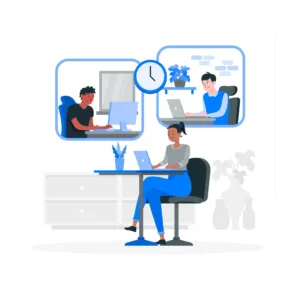In today’s fast-paced legal world, attorneys are constantly looking for ways to maximize their productivity and efficiency. One strategy that has gained significant traction in recent years is leveraging virtual assistants. With the rise of technology, attorneys can now outsource a variety of tasks to virtual assistants, allowing them to focus on their core legal responsibilities. These virtual assistants can handle administrative tasks such as scheduling appointments, managing emails, and organizing files, freeing up valuable time for attorneys to concentrate on their clients and cases. Additionally, virtual assistants can provide research support, draft legal documents, and even assist with marketing initiatives, providing attorneys with a well-rounded support system. By utilizing virtual assistants, attorneys can streamline their workflow, increase productivity, and ultimately deliver better results for their clients. With the ever-increasing demands of the legal profession, incorporating virtual assistants into their workflow is becoming not just a luxury, but a necessity for attorneys aiming to stay competitive and efficient in their practice.
Virtual assistants have become a vital part of the legal industry, revolutionizing the way attorneys manage their workload. Traditionally, attorneys relied on in-house assistants to handle administrative tasks, such as scheduling meetings, managing correspondence, and organizing files. However, this model often led to inefficiencies, as attorneys were still responsible for overseeing and managing their assistants’ work. With the advent of virtual assistants, attorneys now have the option to outsource these tasks to remote professionals who specialize in providing administrative support. Virtual assistants are highly skilled professionals who can handle a wide range of tasks, from managing calendars and emails to conducting legal research and drafting documents. This allows attorneys to focus on their core legal responsibilities, while their virtual assistants take care of the administrative aspects of their practice.
Virtual assistants offer attorneys the flexibility to scale their support as needed. Whether an attorney needs assistance on a project basis or requires ongoing support, virtual assistants can adapt to their workload. This flexibility is particularly beneficial for solo practitioners or small law firms that may not have the resources to hire full-time in-house staff. By leveraging virtual assistants, attorneys can access a pool of talented professionals on a part-time or as-needed basis, saving on overhead costs and increasing their efficiency.
Moreover, virtual assistants bring a fresh perspective and expertise to the table. They are often highly skilled individuals with backgrounds in the legal field or relevant areas of expertise. This means that they can provide valuable insights and support beyond just administrative tasks. For example, a virtual assistant with a background in marketing can assist attorneys in developing and implementing effective marketing strategies. By tapping into the knowledge and skills of their virtual assistants, attorneys can enhance their practice and deliver better results for their clients.
ng into the knowledge and skills of their virtual assistants, attorneys can enhance their practice and deliver better results for their clients.
The benefits of using virtual assistants for attorneys are numerous and extend beyond just increased productivity. Here are a few key advantages:
1. Time-saving:
Virtual assistants handle administrative tasks efficiently, allowing attorneys to focus on their core legal responsibilities. By delegating time-consuming tasks such as scheduling, email management, and file organization, attorneys can maximize their billable hours and allocate their time more effectively.
2. Increased efficiency:
Virtual assistants are specialized professionals who excel in their respective areas of expertise. By outsourcing tasks to virtual assistants, attorneys can benefit from their expertise and ensure that tasks are completed with precision and accuracy. This increases efficiency and reduces the risk of errors or oversights.
3. Cost-effective:
Hiring a virtual assistant is often more cost-effective than hiring a full-time in-house assistant. Virtual assistants typically charge an hourly rate or a fixed fee for specific tasks, allowing attorneys to control their expenses and only pay for the services they need. Additionally, virtual assistants eliminate the need for office space and other overhead costs associated with hiring in-house staff.
4. Access to a diverse skill set:
Virtual assistants come from a variety of backgrounds and possess diverse skill sets. Attorneys can leverage this diversity to their advantage by finding virtual assistants who specialize in areas that complement their practice. For example, a personal injury attorney may benefit from working with a virtual assistant who has experience in medical records review. This allows attorneys to tap into specialized knowledge and skills without having to hire additional staff.
5. Flexibility and scalability:
Virtual assistants offer flexibility and scalability, allowing attorneys to adjust their support as their needs change. Whether an attorney needs assistance on a short-term project or requires ongoing support, virtual assistants can adapt to the workload. This flexibility is particularly beneficial during peak periods or when additional support is required for specific cases or projects.
By leveraging virtual assistants, attorneys can harness these benefits and optimize their practice for enhanced productivity and efficiency.
While traditional assistants have long been a staple in the legal industry, virtual assistants offer several advantages over their in-house counterparts. Here are a few key differences:
1. Location independence:
Virtual assistants work remotely, which means they are not limited by geographical constraints. Attorneys can hire virtual assistants from anywhere in the world, allowing them to access a global pool of talent. This provides attorneys with a broader range of options and the ability to find virtual assistants who specialize in their specific area of practice.
2. Cost-effectiveness:
Virtual assistants are often more cost-effective than traditional assistants. Hiring an in-house assistant comes with additional costs, such as providing office space, equipment, and benefits. Virtual assistants, on the other hand, are typically self-employed professionals who charge an hourly rate or a fixed fee for their services. This allows attorneys to control their expenses and only pay for the services they need.
3. Flexibility:
Virtual assistants offer flexibility and scalability, allowing attorneys to adjust their support as needed. Attorneys can hire virtual assistants on a part-time or as-needed basis, providing them with the flexibility to scale their support up or down depending on their workload. Traditional assistants, on the other hand, are typically hired on a full-time or part-time basis, which may not always align with the fluctuating demands of the legal profession.
4. Specialized expertise:
Virtual assistants often possess specialized skills and expertise that can benefit attorneys. Whether it’s conducting legal research, drafting legal documents, or assisting with marketing initiatives, virtual assistants bring a diverse range of skills to the table. Traditional assistants may not have the same level of expertise or may require additional training to perform these tasks.
While traditional assistants still play an important role in many law firms, virtual assistants offer attorneys the opportunity to enhance their practice with increased flexibility, cost-effectiveness, and access to specialized skills.
Virtual assistants play a crucial role in increasing productivity for attorneys by taking on various tasks that would otherwise consume valuable time and resources. Here’s how virtual assistants contribute to enhanced productivity:
1. Administrative tasks:
Virtual assistants excel in handling administrative tasks, allowing attorneys to focus on their core legal responsibilities. From managing calendars and scheduling appointments to organizing files and handling correspondence, virtual assistants streamline administrative processes and ensure that essential tasks are completed efficiently. This frees up attorneys’ time and enables them to concentrate on their clients and cases, leading to increased productivity.
2. Research support:
Legal research is a time-consuming task that requires expertise and attention to detail. Virtual assistants with a background in legal research can assist attorneys by conducting thorough and accurate research, saving attorneys valuable time. By leveraging the research skills of their virtual assistants, attorneys can access the information they need to build strong cases and make informed decisions, ultimately increasing their productivity and effectiveness.
3. Document drafting:
Drafting legal documents can be a labor-intensive process that demands precision and accuracy. Virtual assistants with experience in legal document drafting can assist attorneys by preparing drafts based on provided guidelines and templates. Attorneys can review and make necessary revisions, significantly reducing the time and effort required to draft legal documents from scratch. By collaborating with virtual assistants on document drafting, attorneys can increase their efficiency and productivity.
4. Marketing support:
Marketing is an essential aspect of running a successful law practice. Virtual assistants with marketing expertise can assist attorneys in developing and implementing effective marketing strategies. From managing social media accounts and creating content to optimizing websites for search engines, virtual assistants can help attorneys establish a strong online presence and attract new clients. By leveraging the marketing skills of their virtual assistants, attorneys can enhance their visibility and productivity in acquiring new business.
By delegating these tasks to virtual assistants, attorneys can focus their time and energy on their core legal responsibilities, leading to increased productivity, efficiency, and ultimately better results for their clients.
Virtual assistants can handle a wide range of tasks for attorneys, providing comprehensive support to streamline their workflow. Here are some common tasks that virtual assistants can assist attorneys with:
1. Administrative tasks: Scheduling appointments, managing calendars, organizing files, and handling correspondence.
2. Legal research: Conducting legal research, analyzing case law, and summarizing key findings.
3. Document drafting: Assisting with the preparation and drafting of legal documents, such as contracts, briefs, and pleadings.
4. Client communication: Managing client inquiries, responding to emails, and maintaining effective communication.
5. Marketing support: Assisting with marketing initiatives, such as managing social media accounts, creating content, and optimizing websites for search engines.
6. Billing and invoicing: Managing billing and invoicing processes, including tracking billable hours and preparing invoices.
7. Client intake and management: Assisting with client intake processes, organizing client information, and managing client databases.
8. Project management: Coordinating and managing projects, including tracking deadlines, delegating tasks, and ensuring timely completion.
By delegating these tasks to virtual assistants, attorneys can optimize their practice and focus on providing exceptional legal services to their clients.
Finding and hiring the right virtual assistant is crucial for attorneys looking to leverage their services effectively. Here are some steps to consider when finding and hiring a virtual assistant:
1. Define your needs: Determine the specific tasks and areas where you require assistance. This will help you identify the skill sets and expertise you need in a virtual assistant.
2. Conduct thorough research: Look for virtual assistants who specialize in the areas you need support in. Consider their experience, qualifications, and reviews from previous clients to ensure they are a good fit for your practice.
3. Interview candidates: Conduct interviews with potential virtual assistants to assess their communication skills, work style, and compatibility with your practice. Ask for references and samples of their work to evaluate their capabilities.
4. Set clear expectations: Clearly communicate your expectations, including deadlines, deliverables, and preferred communication channels. Establish a clear workflow and provide the necessary resources for your virtual assistant to perform their tasks effectively.
5. Start with a trial period: Consider starting with a trial period to assess the working relationship and ensure that the virtual assistant meets your expectations. This allows both parties to evaluate compatibility and make adjustments if necessary.
6. Establish effective communication: Regularly communicate with your virtual assistant to provide feedback, address concerns, and ensure that tasks are being completed according to your requirements. Utilize technology tools such as project management platforms and video conferencing to facilitate effective communication.
By following these steps, attorneys can find and hire virtual assistants who are a good fit for their practice and maximize the benefits of their services.
To ensure a productive working relationship with virtual assistants, attorneys should follow these best practices:
1. Clear communication: Clearly communicate your expectations, deadlines, and preferences to your virtual assistant. Provide detailed instructions and be available for questions or clarifications.
2. Establish boundaries: Clearly define the scope of work and set boundaries to avoid potential misunderstandings. Establish guidelines for working hours, response times, and communication channels.
3. Regular check-ins: Schedule regular check-ins to review progress, provide feedback, and address any issues or concerns. This helps maintain open lines of communication and ensures that tasks are on track.
4. Provide necessary resources: Ensure that your virtual assistant has access to the necessary resources, such as software, files, and templates, to perform their tasks effectively. Provide clear instructions and guidelines for using these resources.
5. Encourage autonomy: Virtual assistants are skilled professionals who excel in their respective areas. Encourage autonomy and trust your virtual assistant to complete tasks without micromanaging. This allows them to work efficiently and take ownership of their responsibilities.
6. Evaluate performance: Regularly evaluate your virtual assistant’s performance to ensure that tasks are being completed to your satisfaction. Provide constructive feedback and address any areas for improvement.
By following these best practices, attorneys can establish a productive working relationship with their virtual assistants and maximize the benefits of their services.
Virtual assistants offer a wide range of services that cater specifically to the needs of attorneys. Here are some common virtual assistant services that attorneys can leverage:
1. Administrative support: Scheduling appointments, managing calendars, organizing files, handling correspondence, and managing emails.
2. Legal research: Conducting legal research, analyzing case law, and summarizing key findings.
3. Document drafting: Assisting with the preparation and drafting of legal documents, such as contracts, briefs, and pleadings.
4. Client communication: Managing client inquiries, responding to emails, and maintaining effective communication.
5. Marketing support: Assisting with marketing initiatives, such as managing social media accounts, creating content, and optimizing websites for search engines.
6. Billing and invoicing: Managing billing and invoicing processes, including tracking billable hours and preparing invoices.
7. Client intake and management: Assisting with client intake processes, organizing client information, and managing client databases.
8. Project management: Coordinating and managing projects, including tracking deadlines, delegating tasks, and ensuring timely completion.
These services can be tailored to the specific needs of attorneys and can be adjusted as their practice evolves.
In today’s fast-paced legal world, attorneys are constantly seeking ways to enhance their productivity and efficiency. Leveraging virtual assistants has become a popular strategy for attorneys to streamline their workflow and focus on their core legal responsibilities. Virtual assistants offer a range of benefits, including time-saving, increased efficiency, cost-effectiveness, access to specialized expertise, and flexibility. By delegating administrative tasks, legal research, document drafting, and marketing support to virtual assistants, attorneys can maximize their productivity and deliver better results for their clients. Finding and hiring the right virtual assistant is crucial, and attorneys should follow best practices to establish a productive working relationship. With the ever-increasing demands of the legal profession, virtual assistants have become a necessity for attorneys aiming to stay competitive and efficient in their practice.




